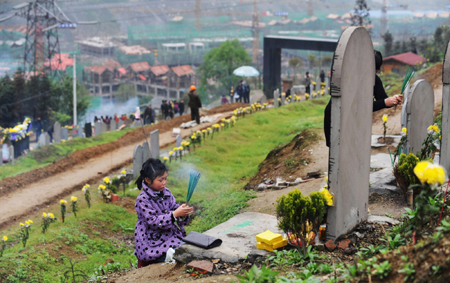Society
Sichuan redux: Keeping mom's memory clean
By Wang Yan (China Daily)
Updated: 2010-04-05 09:15
 |
Large Medium Small |
|
 Ma Qian, 7, burns incense in front of the tombstones for her father who died during the Wenchuan earthquake in 2008, in Wenchuan, Southwest China's Sichuan province, April 3, 2010. The traditional Qing Ming Festival or Tomb-sweeping Day will fall on April 5 this year. [Photo/Xinhua] |
Residents of earthquake-hit region return to pay respects
BEIJING: After one and a half years away from Beichuan, one of the hardest hit counties in Sichuan's devastating 2008 earthquake, 9-year-old Ruirui returned to his old home to pay respects to his mother.
"Mom, please don't worry about me. My new mom is nice to me, and I even have a little sister now," the boy murmured, after handing incense to his dad standing by his side.
It was 7 am on Saturday morning, the first day of this year's Qingming Festival, or Tomb-Sweeping Day. Ruirui had already arrived at the tombstone of his mom, who died during the May 12, 2008 earthquake.
| ||||
Ruirui's father, Yu Zugui, is a migrant worker who works outside Sichuan. Yu told the Chengdu Evening News that Ruirui's new mom was an earthquake volunteer from Hebei province. The new family was formed during the Spring Festival in 2009.
The father and son were among the thousands of people who returned home to mourn their lost relatives during the quake.
In Yingxiu town of Wenchuan - the epicenter of the earthquake - yellow chrysanthemums were placed all over local cemeteries and the grey ruins of shattered concrete buildings on Sunday.
In Beichuan, where almost 21,000 people - two-thirds of the county seat's population - died or disappeared in the earthquake, white paper flowers were tied to trees. Fluttering in the gentle spring breeze, they seemed to whisper people's grief across the quiet streets and rivers.
After the earthquake, the government decided not to rebuild the Beichuan county seat, but turned the area into an earthquake museum. The old county seat has been closed since the quake except for public commemorations, such as the quake anniversary, the Spring Festival and the Qingming Festival.
The area opened at 10 am on Friday, but only to previous local Beichuaners.
"The number of visitors almost reached 10,000 on Saturday alone," He Long, deputy director of Beichuan public security bureau, was reported as saying.
Temporary checkpoints were set up around the area to direct traffic, He said.
Over 30,000 vehicles and 240,000 people visited Beichuan county on Tomb-Sweeping Day last year, leading to a traffic jam over 10 kilometers long, local media reported.
Not only the public, but also the police were in mourning.
Over 140 policemen from the Beichuan public security bureau gathered in the county to mourn their 20 colleagues who died during the earthquake.











